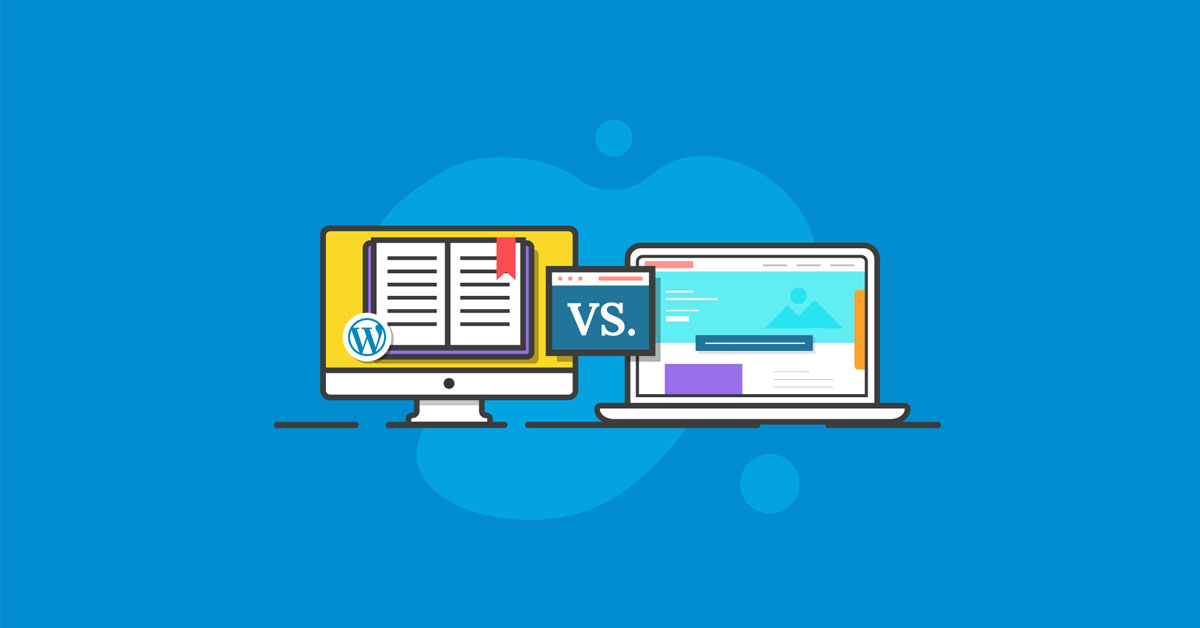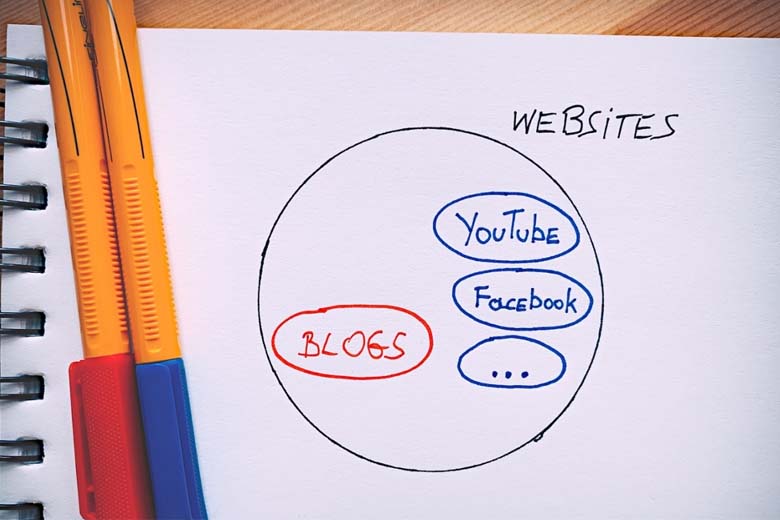Inquiries about two topics are frequently asked. “Blog vs. Website: What’s the Difference?” is the central topic of both conversations. Also, “Should I start a blog or a website?” The fact that people struggle with these challenges is not surprising. The whole debate between a blog and a website can be perplexing if you’ve never considered it before.
Contents
- 1. What Distinctions Do Blogs and Websites Have?
- 2. What Exactly Is a Website?
- 3. A Blog: What Is It?
- 4. How can I decide if I want a website or a blog?
- 5. Do Blogs and Websites Allow Me to Run a Business?
- 6. Can My Website or Blog Be Profitable?
- 7. Do My Website or Blog Allow Me to Sell?
- 8. Can I Make a Website or Blog of My Own?
- 9. Estimating the price of creating a blog versus a website
- 10. Conclusion

In this brief introduction, we’ll cover the key differences between blogs and websites, how to decide which one you need, how much each costs, and how to easily create either one.
1. What Distinctions Do Blogs and Websites Have?
Let’s begin with the following claim, which could surprise you:
As a blog, a website is.

blog and websites
Think of it this way:
This implies that a blog is a specific type of website.
To make this easier to understand, let’s start with the root of the issue:
2. What Exactly Is a Website?
Any web address, such as wikipedia.org, will take you to a website if you open Chrome or Safari and put it in. If you use your web browser to navigate any place, you’ll actually land on a website. This indicates that Google, YouTube, and Facebook are all websites.
Websites can be recognized by their web addresses or domain names. You can see that wikipedia.org is the website’s URL. The Facebook website’s domain name is facebook.com, etc.
What particularly separates a blog from a website, then?
The aforementioned graph suggests that blogs are a subset of web pages. They all have four wheels and an engine, but race cars have a very specific purpose. This is similar to how race cars differ from conventional cars.
3. A Blog: What Is It?
A blog is a website where the main goal is to prominently display certain blog entries by displaying them in reverse chronological order on the blog’s home page (newest first).
The idea is actually pretty simple, despite the fact that it could initially seem complicated. The goal is to have the most recent blog post prominently displayed on a blog’s homepage for all visitors.
This often appears as follows:

a Blog
The blog’s administrator, whether they are an individual or a business owner, can share the news, articles, and stories that are now most relevant.
However, blogs are mostly text-based. To put it another way, written content takes precedence over visual stuff like images, etc.
A CMS is also used by blogs (Content Management System). It’s just a fancy name for a tool that lets you edit blog entries in a manner akin to that of Google Docs or Microsoft Word. Controlling your material is made simpler because this CMS doesn’t require you to be an expert in web development or programming.
On a generic website, there isn’t any such restriction, on the other hand. Websites are free to decide how to present their content. Furthermore, the information can be presented in a wide range of ways, including text-only pages, images, videos, products from an online store, and so forth. Websites might benefit from a CMS as well. They can, however, also employ static HTML-only web pages that were made by a web developer.
Following that, let’s address the following:
4. How can I decide if I want a website or a blog?
Before we aid you in finding the solution to this question, let’s start somewhere else.
There is no longer a need to choose between the concepts of “blog vs. website“
Thanks to the modern instruments at our disposal, we might have both simultaneously. The best way to do it is to use a powerful website CMS to integrate a blog into your existing website. Consequently, you end up with a usable website that includes blogging capabilities.
The website you’re reading now, for instance, uses WordPress, the most popular and effective CMS.
- WordPress is easy to use, free, and open-source even for beginners.
- Its purpose was to serve as a blog engine. WordPress was first created as a blogging CMS. However, it has evolved a little more over time.
- WordPress may power various website types, including blogs.
- At the time of writing, WordPress is used to power more than 30% of the internet. That’s right, around one in three websites on the internet are powered by WordPress.
Again, you shouldn’t view this as requiring you to choose between a website and a blog. Create your website with WordPress instead, and then decide whether to add a blog later. It is the only choice that will ultimately be more dependable.
5. Do Blogs and Websites Allow Me to Run a Business?
If you want to start a website or blog for your internet business, your choice between the two becomes much more crucial.
As evidenced by our experience, blogs are incredibly effective business tools.
- Hubspot estimates that companies with blogs get 55% more visitors than those with merely standard websites.
- Your blog provides you with a variety of special benefits. Google and other search engines are among those that adore blogs. This is due to the fact that a blog will always be more up-to-date than static websites and have fresh content to share with viewers. Google is quite pleased with this kind of thing!
- Every time you publish a new post on your blog, WordPress will ping Google to let them know about it so they can view and index your new content. On static websites, this benefit is not accessible.
- It is also easy to promote your business on social media when you have a blog. Think of this: What specifically can you communicate with your followers on social media if your website is stale? the description of your company on the same website over and over again? Boredom will set in rapidly for everyone. New blog posts, on the other hand, are perfect for disseminating among your social network following. Due to the regularly updated information, your admirers will be more inclined to check it out.
One disadvantage of blogging is that new content must be produced constantly for each blog. Be aware that you should aim to produce a new blog post every two weeks at the very least. A blog, therefore, necessitates some ongoing time commitment. On the other hand, when contrasting static websites to blogs, one-time efforts are commonly made with static websites, which might be to their advantage.
Read more: An evaluation of the top website builders
6. Can My Website or Blog Be Profitable?
Yes, to put it simply.
There are numerous ways for your blog or website to make money.
We recommend reading the post for more information, but generally speaking, the simplest ways to monetize your website are to:
- The ad space on the website or blog for a cost (usually via AdSense)
- Consider donating
- To receive a commission, market other people’s products via affiliate marketing.
- Sell your own products

7. Do My Website or Blog Allow Me to Sell?
As we just mentioned, the most popular CMS, WordPress, has made a name for itself by being able to power any form of blog or website imaginable, including online commerce!
So, to answer the question fast, you can sell on your website or blog.
- If you use WordPress, you can begin selling items once you’ve installed the WooCommerce plugin. As a result, your website or blog will be changed into an entire e-commerce store.
- An e-commerce store module is already included if you’re using a respected website builder, like Wix or Squarespace.
8. Can I Make a Website or Blog of My Own?
Again, the answer is yes.
To build a blog or website on your own, you don’t even need any specialized knowledge or skills.
9. Estimating the price of creating a blog versus a website
Your choice of website or blogging platform will affect the cost.
In order to start your website, you must first purchase a web hosting plan and a domain name if you decide to use WordPress to build it.
- The location where you store your website or blog is known as web hosting.
- Your website’s domain name is where people can find it online.
Although using hosting or domains might initially appear intimidating, if you get the hang of it, these things are really rather straightforward.
For instance, buying a WordPress hosting plan from a company like Bluehost is as simple as it gets. Simply register a hosting account and pay the $2.75 monthly fee to get started.

As part of the package, you get a free domain name, and Bluehost will handle the installation so that you have a fully functional WordPress website. Simply select a WordPress theme and configure it to look the way you want it to.
If you’d rather use a website builder than WordPress, such as Squarespace or Wix, the same signup-based procedures apply. By the time it is finished, you will have a working blank website that you can further customize. This route, though, might cost a little more:
- Both the consumer and business subscriptions for Squarespace start at $12 per month.
- The monthly starting prices for Wix’s personal and business plans are $13 and $23, respectively.
Generally speaking, WordPress will be far less expensive overall.
10. Conclusion
We hope this article has improved your knowledge of blogs and websites. If you enjoyed reading this post, we encourage you to come back often to our website to learn more about WordPress, hosting, VPS, website, theme, and plugins,… Additionally, you may find us on Facebook and Twitter.
Read more:
- An evaluation of the top website builders
- What will a custom WordPress theme cost you?
- The Best Cheap Web Hosting Companies Comparison
- Ten Crucial Metrics to Track for Your WordPress Site
- Top 10 best domain name generators for you
- Godaddy coupons and all you need to know
NameCab

